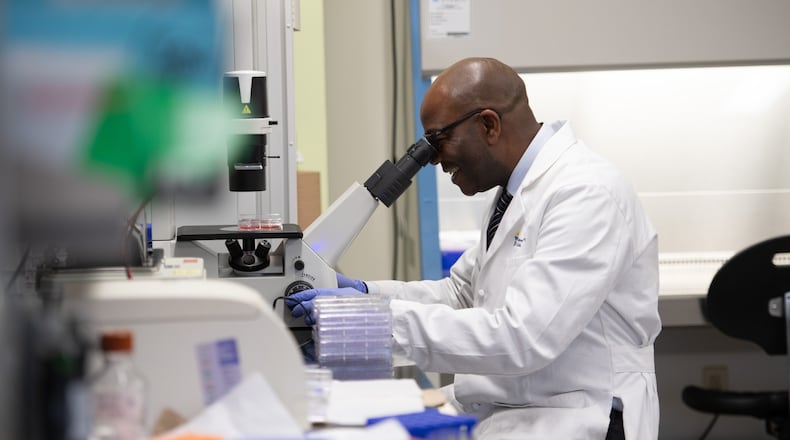Amos was inspired to go into cancer research following the first time he encountered someone with cancer. He was in his village in Nigeria when he talked to a neighbor who had recently been diagnosed with breast cancer, he said. The woman asked Amos to help women like her.
“I may not have all the answers, but I can depend upon the knowledge that God has given me to find solutions to human disease,” Amos said.
Amos graduated with his Ph.D. in pharmacology from the University of Nigeria and began working for the National Institute for Pharmaceutical Research in Abuja, Nigeria, as a researcher and professor.
“I asked God to use me as an instrument to help the world better understand this disease,” Amos said.
While at the National Institute for Pharmaceutical Research, he studied the effects of natural products — plants, fruits and vegetables — on different disease states, including hypertension, diabetes, malaria and sickle cell disease.
Upon moving to the United States in 2000, Amos began training at the University of Virginia so he could better understand the molecular basis of cancer growth, specifically in the brain and prostate.
Amos joined Cedarville University’s faculty in the school of pharmacy 10 years later after publishing several research papers on cancer research.
Cedarville gave him a platform to share his faith while both teaching students and working alongside them to further his cancer research.
“One of my responsibilities is to ensure that I impact knowledge and skill sets required for my students to be very successful clinicians,” Amos said.
“With that in mind, I am constantly engaging and training students to acquire the necessary understanding of the key drivers of cancer growth and the biology that drives their metastatic phenotypes,” Amos said.
Amos continued studying cancer cells and the molecular basis of cancer growth, while exploring the effects of natural products on various diseases — specifically targeting brain tumors.
“I wanted to research the use of plant compounds to help in the management of brain tumors and glioblastomas,” Amos said. A glioblastoma is the most common type of malignant brain tumor.
The average malignant brain tumor survival time is 12-18 months with only about 25% of patients surviving more than one year and only 5% of patients surviving more than five years, Amos said.
When a patient develops a glioblastoma, they are placed on a chemotherapy drug called temozolomide, which has a minimal clinical outcome, he said.
“Because of this, I wanted to find out whether there were things in nature that could help us unravel the mystery of this disease and better manage brain tumors,” Amos said.
Due to the resistance and low clinical outcomes of temozolomide on both the tumor and patient, Amos decided to research whether he could use a lower dose of temozolomide, as well as a small dose of two different natural products found in plants to treat brain tumors, as well as other cancers.
“We are hoping to achieve a number of clinical outcomes with these drug combinations, namely: decrease the potential side effects of the use of chemotherapy agents alone, enhance patient compliance and increase the overall patient outcome and quality of life,” Amos said.
Using an in vitro setting — the use of a bench in the lab as opposed to live animals — Amos and his team of Cedarville Doctor of Pharmacy students studied the effect of both agents to treat brain tumors.
The results were overwhelming, Amos said.
“Our preliminary data in vitro clearly shows that this combination is synergistic,” Amos said. “When we use a low dose of temozolomide and our natural product, we have a better biological readout than when we use a higher concentration of temozolomide.”
Encouraged by the positive results, Amos plans to continue his research with the help of his students.
“I have had many Cedarville students from pharmacy, math and science who have expressed interest in our cancer research,” Amos said. “If these students have an interest, it behooves me to train and come alongside them in their passion.”
Located in southwest Ohio, Cedarville University is a Baptist university with undergraduate programs in arts, sciences, and professional programs, and graduate programs. With an enrollment of 5,456 students in 175 areas of study, Cedarville is one of the largest private universities in Ohio.
About the Author


